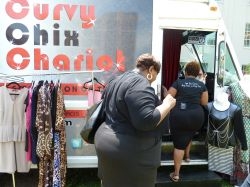After food trucks, fashion hits the road in US

Lia Lee’s truck is there, too — but she’s selling dresses and jewelry.
“I just restocked this blouse. This is a very nice office top — perfect for summer,” the 27-year-old Lee told one customer browsing in her Street Boutique, a cream and black truck parked in this Washington suburb.
Food trucks have already taken many US cities by storm, but fashion is now also a business on the move in America.
Lee’s truck is set up like a regular brick-and-mortar store, with an elegantly appointed interior lined with racks of dresses and blouses, jewelry cases and even a tiny dressing room.
“In late 2010, there were probably five in the nation,” said Jeanine Romo, the co-founder and vice president of the American Mobile Retail Association, which brings together the country’s mobile stores.
Today, there are between 300 and 400 nationwide, most of them focused on selling clothes. A few offer shoes, beauty products and even pet accessories.
“We just see that growth kind of keeps going,” Romo told AFP.
Lee long dreamed of having her own store — one that didn’t move. But money was tight.
“After writing several business plans and going to consulting, I realized it was not financially possible for me to do,” Lee explained. “This is more affordable, and it fits my personality better. I like the variety, going to different neighborhoods.”
– Original items –
Like Lee, Donna Hundley, a 30-something fashionista, did some research and found that, in California, fashion trucks are all the rage.
She launched her red and gray Curvy Chix Chariot in September 2013. It’s an old postal van she bought for $2,200, and then renovated, decorated and refitted.
Hundley — whose store, as the name indicates, caters to voluptuous women — sources items from young designers.
“We tend to have all the plus-size clothing always be the same — it’s always black, flowers and they always want to put us in cheetah print,” she said with a laugh.
“I pride myself in making sure that I find some good quality pieces, and partner with some good designers.”
While a brick-and-mortar store can require an investment of as much as $500,000, putting a fashion truck on the road costs about an average of $20,000, Romo said.
Raising that kind of cash is even easier thanks to crowdfunding on the Internet.
Many times, retail trucks are more of a labor of love than a lucrative job. Half of new truck owners — the vast majority of them women — keep their day jobs in order to pay their costs, such as parking and permit fees.
Shelley Sarmiento, who is in her 60s, followed an unusual path.
The co-owner of White House Black Market — a chain with more than 100 stores, 3,000 employees and $180 million in annual sales — sold her stake a decade ago.
Two years ago, Sarmiento — who teaches at the Fashion Institute of Technology in New York — said she was “standing at a grilled cheese food truck” in the Big Apple and thought — why not put clothes on a truck?
Since then, her Little White Fashion Truck has rolled quickly along. She now has four trucks in Maryland and Tennessee.
Her tips: don’t run up debts, make as small an initial investment as possible, offer items at low prices and offer variety, so that everyone “can’t resist buying something.”
During her lunch break in Washington, Miranda Gillis indeed could not resist. She picked up a “beautiful green dress” from the Curvy Chix Chariot.
“This is the first time I’ve ever seen a fashion truck,” said the 52-year-old Gillis, president of the American Federation of Government Employees.
“It’s an excellent idea. It’s convenient, and she has good stuff. It’s more personalized.”
Elizabeth Gibbons, 29, picked up a pair of shorts from Street Boutique.
“There is really not a lot around this particular area,” Gibbons said, calling the truck “really fun and so convenient too.”

